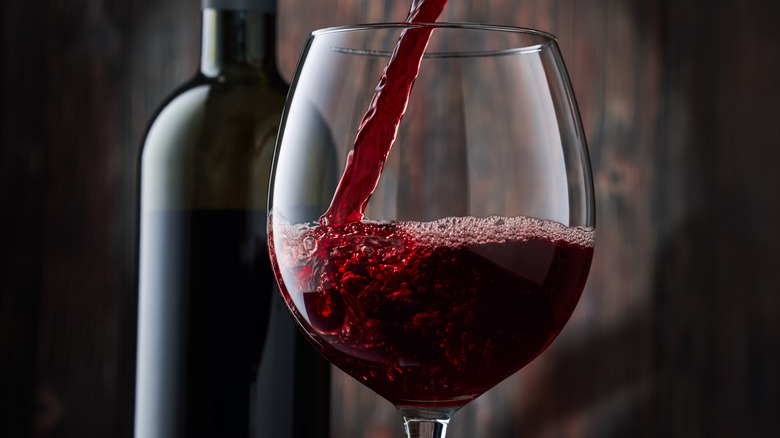Is It Safe To Drink Wine When You're Pregnant?
A glass of wine is often seen as a go-to for relieving stress after a tough day. Many studies highlight the health benefits of drinking red wine, namely due to the fact that it contains antioxidants called polyphenols and resveratrol. Polyphenols are thought to protect the heart because they help raise the level of high-density lipoprotein (HDL) cholesterol in our bodies, otherwise known as the "good" kind. Additionally, some studies indicate that resveratrol could help lower low-density lipoprotein (LDL) cholesterol, which is the "bad" kind (via Mayo Clinic). While occasionally drinking wine might boost your health, is it okay to do while you're pregnant?
In short, the answer is no. According to the Centers for Disease Control and Prevention (CDC), alcohol in any amount is not safe to drink during pregnancy. Drinking alcohol, including wine, anytime during pregnancy increases the risk of miscarriage and stillbirth, and can cause problems with the unborn baby's central nervous system.
Drinking wine increases the risk of fetal alcohol spectrum disorders
Alcohol has a devastating effect on unborn babies because their developing bodies do not metabolize alcohol the way a grown human does. Alcohol can prevent oxygen and vital nutrients from reaching the brain and other organs, causing a variety of disorders. Symptoms of fetal alcohol spectrum disorders (FASD) can include facial abnormalities, low IQ, vision and hearing problems, sleep difficulties, short height, a small head, and mental and behavioral problems (via Cleveland Clinic).
Fetal alcohol syndrome (FAS) is considered one of the more severe disorders under the FASD spectrum. Symptoms of FAS include lack of coordination, lack of focus, hyperactivity, mood swings, poor judgement, heart problems, kidney defects, and physical abnormalities. Alcohol-related neurological disorders (ARND) include learning problems, weak memory, short attention span, intellectual disorders, and difficulty grasping math.
If you want to reap the benefits of resveratrol and polyphenols without drinking wine, there are ways to do so. Try adding food items that are also rich in antioxidants to your next meal such as apples, dark chocolate, olive oil, or turmeric (via University of Texas Southwestern Medical Center).


